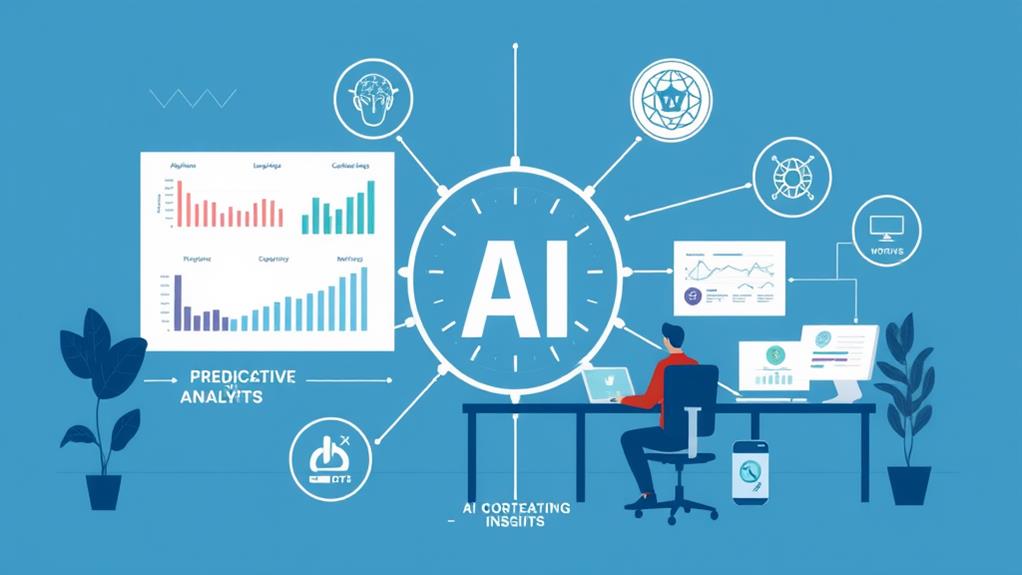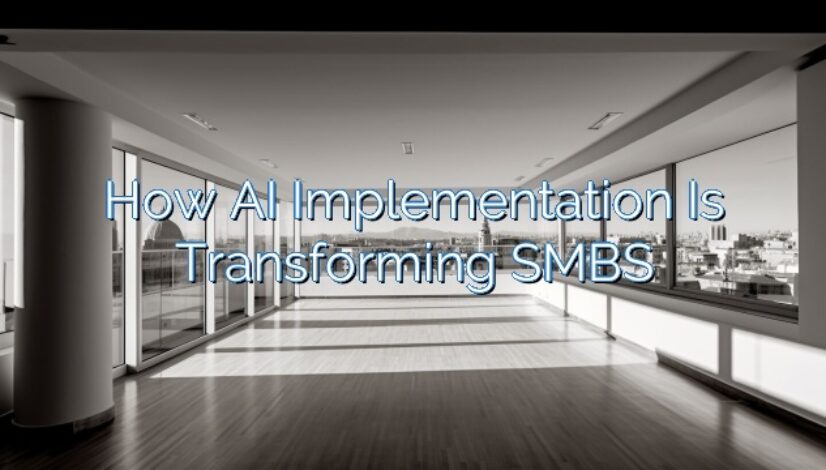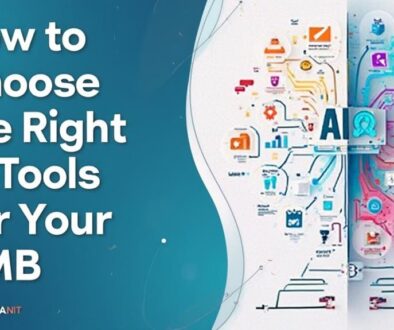How AI Implementation Is Transforming SMBS
AI implementation is transforming small and medium-sized businesses (SMBs) by automating routine tasks, enhancing decision-making, and improving customer engagement. Approximately 40% of SMBs are adopting AI technologies such as machine learning and natural language processing. These tools streamline operations, optimize resource allocation, and considerably reduce costs. Additionally, AI-driven insights enable proactive financial management and risk assessment, allowing businesses to forecast market trends effectively. As automation improves customer interactions and personalizes engagement, SMBs foster loyalty and satisfaction. Such dynamic changes signal a pivotal shift in business practices, underscoring the evolving landscape of SMB operations and strategy. More insights await further exploration.
Key Takeaways
- AI adoption enhances decision-making capabilities, enabling SMBs to utilize resources more efficiently and improve strategic focus.
- Streamlined operations through AI automation lead to greater productivity and significant cost savings for SMBs.
- Predictive analytics powered by AI assists SMBs in forecasting market trends and consumer behaviors, facilitating better planning.
- AI technologies improve customer interactions by enabling personalized engagement and quicker response times, enhancing customer satisfaction.
- Training and upskilling employees in AI competencies are crucial for adapting to technological changes and fostering innovation in SMBs.
Understanding AI in SMBs

In recent years, the adoption of artificial intelligence (AI) has garnered significant attention from small and medium-sized businesses (SMBs), with approximately 40% of these enterprises integrating AI technologies into their operations. Understanding AI basics is vital for SMBs looking to leverage this transformative technology. AI terminology often includes concepts such as machine learning, natural language processing, and neural networks, which can initially be intimidating.
However, as businesses explore deeper into AI applications, they discover its potential to streamline processes and enhance decision-making. The integration of AI tools can automate mundane tasks, thereby freeing up human resources for more strategic endeavors.
Nevertheless, AI limitations must be acknowledged; these technologies can sometimes yield biased outcomes if not properly managed, highlighting the importance of AI ethics in development and deployment.
Moreover, AI trends indicate a growing interest in data privacy and ethical considerations surrounding AI usage, especially among consumers who demand transparency. As SMBs navigate AI challenges—including costs, implementation hurdles, and skill gaps—investing in AI education becomes essential. Training employees to understand and operate AI tools fosters a culture of innovation, ensuring businesses remain agile and competitive in an evolving landscape.
Ultimately, as SMBs progress in their AI journey, adopting a thoughtful and informed approach is paramount. By grasping the fundamentals and recognizing the ethical implications, businesses can engage with AI not merely as a tool, but as a partner in achieving their broader objectives.
Benefits of AI Adoption
The adoption of AI in small and medium-sized businesses (SMBs) offers significant advantages that can transform operations.
Enhanced decision-making capabilities, coupled with cost efficiency improvements, allow businesses to utilize resources more effectively.
Additionally, streamlined operations contribute to increased productivity, ultimately fostering a more agile and competitive organization.
Cost Efficiency Improvements
Harnessing the power of artificial intelligence (AI) can lead to significant cost efficiency improvements for small and medium-sized businesses (SMBs). By implementing AI-driven solutions, these organizations can experience profound cost reductions that stem from enhanced resource optimization. This shift enables more effective workforce allocation, ensuring that human capital is maximized where it is needed most.
Operational savings are realized through automation, which streamlines routine tasks and reduces the potential for human error. Consequently, SMBs can achieve a notable productivity increase, further contributing to their bottom line.
Enhanced expense management tools powered by AI allow businesses to maintain budgeting efficiency by providing real-time insights into financial forecasting, leading to informed investment strategies.
Additionally, AI can enhance procurement processes by identifying ideal suppliers and negotiating better terms, resulting in long-term financial benefits. The ability to analyze vast data sets empowers SMBs to make more strategic decisions regarding resource allocation and spending, revealing further avenues for savings.
Ultimately, AI not only facilitates an immediate reduction in costs but also fosters a proactive culture of financial prudence that can sustain enterprise growth and resilience in an increasingly competitive landscape.
Enhanced Decision-Making
AI implementation not only enhances cost efficiency but also markedly improves decision-making processes within SMBs. By harnessing data-driven insights, businesses can make informed choices that align with their strategic goals.
Predictive analytics plays a pivotal role in forecasting future trends, enabling SMBs to anticipate market shifts and adjust their strategies proactively. Risk assessment tools facilitate a more nuanced understanding of potential challenges, equipping decision-makers with essential information to mitigate risks effectively.
Through scenario modeling, organizations can visualize different outcomes based on varying variables, allowing for more dynamic planning. The incorporation of real-time feedback mechanisms guarantees that decision-making is grounded in the latest performance metrics, fostering agility and responsiveness.
In addition, collaborative decision-making becomes possible as AI tools enhance communication among teams, breaking down silos and promoting transparency. Trend identification through AI algorithms leads to smarter resource allocation, guaranteeing that investments are directed where they can yield the highest returns.
Ultimately, these advancements empower SMBs to navigate complexities with confidence, fostering a culture of innovation and strategic foresight that is essential for sustained growth and freedom in the marketplace.
Streamlined Operations
Integrating advanced technologies into operational frameworks can lead to significant enhancements in efficiency for small and medium-sized businesses (SMBs). By adopting AI, SMBs can achieve workflow optimization through streamlined process integration, allowing for improved resource allocation and enhanced operational efficiency.
AI-driven systems facilitate task automation, freeing team members from repetitive duties and enabling them to focus on higher-value activities.
In addition, AI enhances project tracking, providing real-time performance metrics that help businesses assess progress and identify bottlenecks. This data management capability fosters better decision-making and enhances team collaboration, as all members can access updated information and insights seamlessly.
Additionally, with advancements in system interoperability, different software solutions can communicate effectively, creating a unified operational environment.
As SMBs leverage AI technologies, they will not only improve internal workflows but also gain a competitive edge in the market. The freedom to adapt quickly to changes, innovate processes, and allocate resources efficiently can lead to significant long-term benefits.
Ultimately, embracing AI in operational practices promises to transform SMBs into agile, well-coordinated entities adept at maneuvering the complexities of today’s business landscape.
Automating Customer Interactions

Automating customer interactions through AI technologies such as chatbots and virtual assistants has become a transformative strategy for SMBs.
These tools not only enhance personalized engagement but also streamline communication channels, fostering a more efficient customer experience.
Chatbots and Virtual Assistants
In today’s fast-paced business environment, harnessing the power of chatbots and virtual assistants has become essential for small and medium-sized businesses (SMBs) aiming to streamline customer interactions. By leveraging advanced chatbot technology, SMBs can automate responses to common inquiries, greatly reducing wait times and enhancing overall customer satisfaction.
These tools are not merely about providing information; they also empower customers to engage with brands at their convenience, fostering a sense of autonomy.
Virtual assistant integration further elevates the customer experience by allowing these systems to manage tasks such as appointment scheduling, order processing, and live chat support. This seamless approach not only optimizes workflow but also frees up human resources to focus on more complex queries and strategic initiatives.
Moreover, the implementation of chatbot technology helps businesses maintain consistent communication while gathering invaluable data on customer preferences and behaviors. This wealth of information can be instrumental in future marketing strategies or service enhancements, ensuring that SMBs remain competitive in their respective markets.
Personalized Engagement Strategies
The rise of chatbots and virtual assistants has paved the way for more sophisticated personalized engagement strategies within SMBs. Leveraging AI technologies, businesses can implement customer segmentation techniques that categorize their audience based on distinct behaviors, preferences, and demographics. This enables behavior prediction, allowing companies to anticipate customer needs and cater to them with tailored solutions.
Targeted messaging is a significant advantage of AI-driven engagement strategies. By analyzing engagement metrics, SMBs can refine their approaches, helping to drive higher interaction rates.
Personalized recommendations enhance user experience by providing relevant content customization that resonates with individual users.
Additionally, implementing robust loyalty programs can boost customer retention and foster long-term relationships. AI can facilitate this by analyzing audience insights to uncover trends and preferences, ensuring that promotions are enticing and relevant.
Feedback analysis also plays an essential role, as it allows businesses to understand customer sentiments and refine their strategies accordingly.
Streamlined Communication Channels
Effective communication is essential for the success of small and medium-sized businesses (SMBs), and streamlining these channels through AI automation can greatly enhance operational efficiency. AI technologies, such as chatbots and automated email responses, can handle customer inquiries instantaneously, reducing wait times and improving satisfaction. This shift enables human employees to devote their energies to more complex tasks, ultimately fostering a more productive work environment.
In addition, integrating AI-driven collaboration tools enhances internal messaging capabilities, ensuring that team members can communicate seamlessly regardless of their geographical locations. These platforms not only facilitate real-time information sharing but also encourage teamwork by keeping everyone on the same page. Such fluidity is crucial for driving innovation and facilitating responses to market changes.
Implementing AI for customer interactions can also provide valuable data analytics, enabling businesses to gain insights into customer behavior and preferences. This information can lead to more informed decision-making, enabling SMBs to adapt their strategies accordingly.
Streamlining Operations and Processes
While many small and medium-sized businesses (SMBs) face the challenge of managing limited resources, the integration of artificial intelligence (AI) offers a transformative solution for streamlining operations and processes.
By leveraging AI technologies, SMBs can achieve significant gains in process optimization and operational efficiency, allowing them to focus on growth and innovation.
Here are three ways AI can facilitate operational improvements:
- Automated Workflow Management: AI systems can automate repetitive tasks, allowing employees to concentrate on more strategic activities. This results in reduced error rates and faster turnaround times.
- Smart Resource Allocation: By analyzing data from various departments, AI can optimize resource allocation, ensuring that manpower and materials are directed to areas of highest impact. This not only maximizes productivity but also enhances employee satisfaction by reducing bottlenecks.
- Predictive Maintenance: AI can predict equipment failures before they occur, allowing SMBs to perform maintenance proactively. This minimizes downtime and extends the life of critical assets, thereby safeguarding operational reliability.
As SMBs embrace AI, they unveil a pathway to articulate their core values and aspirations without being bogged down by operational inefficiencies.
A streamlined approach not only empowers teams but also positions businesses to compete effectively in today’s dynamic marketplace.
Enhancing Data Analysis and Insights

As SMBs streamline their operations through AI, they can also harness these technologies to enhance data analysis and gain deeper insights into their business performance. The evolution of data analytics, driven by artificial intelligence, offers small and medium-sized businesses the ability to interpret complex datasets with unprecedented simplicity and accuracy.
One of the most significant advancements lies in data visualization. AI tools can transform raw data into intuitive graphics, enabling SMBs to quickly grasp trends and patterns that would otherwise remain buried in spreadsheets. This visual representation not only aids in decision-making but also empowers teams to communicate insights effectively across the organization.
By focusing on visual data storytelling, businesses can enhance collaboration and foster an environment of informed decision-making.
Predictive analytics further amplifies the capabilities of data analysis for SMBs. By utilizing historical data and advanced algorithms, businesses can forecast future trends, consumer behavior, and market conditions with improved precision. This proactive approach allows SMBs to adapt their strategies in real-time, mitigating risks and seizing opportunities before competitors even notice them.
The integration of AI-powered data analysis techniques equips SMBs with the foresight needed to navigate an increasingly competitive landscape. By embracing data visualization and predictive analytics, businesses can operate with greater agility, ultimately leading to improved performance, customer engagement, and long-term sustainability.
As they reveal these insights, SMBs are not just paving their path to success but also embracing a culture of data-driven excellence.
AI-Powered Marketing Strategies
In today’s competitive landscape, AI-powered marketing strategies are revolutionizing how SMBs connect with their target audiences. By leveraging advanced technologies, businesses can create more effective campaigns that resonate deeply with consumers, ultimately driving both engagement and sales. These technologies enable small and medium-sized businesses to analyze consumer behavior and preferences with precision, allowing for highly personalized and timely messaging. As a result, companies can stand out in crowded markets by delivering value-driven experiences that foster loyalty and trust. This approach is instrumental in boosting SMB branding strategies, ensuring a stronger and more recognizable presence in the minds of their target audiences. These tools enable small and medium-sized businesses to analyze vast amounts of data, uncovering valuable insights into consumer behavior and preferences. As a result, companies can boost SMB marketing with AI by personalizing content, optimizing ad placements, and automating routine tasks, allowing teams to focus on creative and strategic initiatives. This approach not only enhances efficiency but also helps businesses stay ahead in an increasingly dynamic market. These technologies enable personalized messaging, allowing businesses to deliver the right content to the right audience at the right time. Successful marketing strategies for SMBs often incorporate data-driven insights to optimize performance and allocate resources more effectively. As a result, small and medium-sized businesses can compete on a more level playing field, fostering growth and long-term customer loyalty.
Here are three key ways AI is transforming marketing for SMBs:
1. Data-Driven Marketing: AI harnesses vast amounts of data to craft personalized marketing messages. This level of customization guarantees that businesses reach the right people with the right message at the right time.
2. Predictive Analytics: AI algorithms analyze historical data to predict future customer behavior. This predictive capability allows SMBs to anticipate market trends, optimize resource allocation, and tailor their marketing efforts for maximum impact.
By understanding potential customer journeys, businesses can formulate strategies that greatly enhance conversion rates.
3. Enhanced Customer Insights: Utilizing AI tools enables companies to gain deeper insights into customer preferences and buying habits. This wealth of information empowers SMBs to refine their marketing campaigns, focusing on elements that truly drive interest and engagement.
As SMBs adopt AI-driven marketing strategies, they find themselves more equipped to navigate the complexities of an evolving market.
The integration of data-driven marketing and predictive analytics yields a competitive edge, enabling these businesses to respond swiftly to emerging consumer trends and preferences.
Ultimately, embracing AI in marketing nurtures a more dynamic, freedom-driven approach to engaging customers and achieving business success.
Future Trends in AI for SMBs

The ongoing integration of AI in marketing strategies has set the stage for significant advancements in the operational capabilities of small and medium-sized businesses (SMBs).
As we look toward the future, emerging trends indicate that AI will further shape the landscape through enhanced predictive analytics and robust machine learning applications. These technologies will enable SMBs to forecast market fluctuations and customer demands with remarkable accuracy, ultimately cultivating a competitive advantage.
Moreover, the emphasis on technology adoption will drive innovation strategies within SMBs, as organizations leverage AI to streamline processes, optimize resource allocation, and bolster workforce integration.
This transformative phase necessitates a focus on skill development, ensuring that employees are equipped to navigate these evolving landscapes effectively.
However, as SMBs embrace AI, they must remain vigilant about AI ethics and data privacy. Striking a balance between leveraging advanced technologies and safeguarding customer information will be paramount in fostering trust and sustaining business growth.
The successful implementation of change management practices will be essential in guiding organizations through this shift, ensuring seamless integration of AI-driven solutions into daily operations.
Frequently Asked Questions
What Common Challenges Do SMBS Face When Implementing Ai?
Charting the AI landscape can feel like scaling Everest for small to medium-sized businesses.
Common challenges include budget constraints that limit access to advanced solutions and integration issues that disrupt existing workflows.
Additionally, employee resistance to technology adoption, coupled with substantial training requirements, hinders progress.
Concerns about scalability, data quality, and vendor reliability further complicate implementation efforts, necessitating a strategic approach to harness AI’s potential effectively within SMBs.
How Can SMBS Measure ROI From AI Investments?
To measure ROI from AI investments, SMBs should focus on defining clear AI metrics aligned with their business objectives.
Key performance indicators (KPIs) like increased productivity, cost savings, and enhanced customer satisfaction can be instrumental.
Additionally, performing a robust investment evaluation that considers both quantitative benefits and qualitative impacts, such as improved decision-making, provides a thorough understanding of AI’s value.
Consistently monitoring these metrics guarantees accountability and informs future investment strategies.
Are There Any Legal Concerns With Using AI in Smbs?
The implementation of AI in small and medium-sized businesses (SMBs) raises significant legal concerns.
Key issues include intellectual property rights associated with AI-generated content, compliance issues with data protection regulations, and the need for bias mitigation to guarantee fair outcomes.
Additionally, ethical considerations regarding transparency standards and potential liability concerns must be thoroughly addressed.
Steering through these legal complexities is essential for SMBs to harness AI effectively while minimizing risks associated with these technologies.
What Skills Do Employees Need to Work With AI Tools?
In a world increasingly illuminated by technological innovation, employees are encouraged to cultivate essential competencies to thrive alongside AI tools.
Proficiency in AI literacy, coupled with robust technical training, fosters an understanding of data analysis and enhances problem-solving abilities.
Furthermore, adaptability skills are paramount as the landscape of AI evolves.
How Can SMBS Ensure Data Privacy While Using Ai?
Ensuring data privacy while utilizing AI is vital for small and medium-sized businesses (SMBs). Implementing robust data encryption techniques safeguards sensitive information, making it less susceptible to breaches.
Furthermore, obtaining user consent is essential; companies must transparently communicate data usage practices to comply with regulations and build customer trust.
Conclusion
The integration of artificial intelligence within small and medium-sized businesses symbolizes a transformative dawn in operational efficiency and customer engagement. As this technology becomes deeply woven into the fabric of business strategy, a new era characterized by agility and insightful decision-making emerges. The ongoing evolution of AI heralds not merely a shift in processes, but an opportunity for SMBs to thrive amidst a rapidly changing landscape. This journey reflects a profound metamorphosis, lighting the path toward sustainable growth and innovation.




